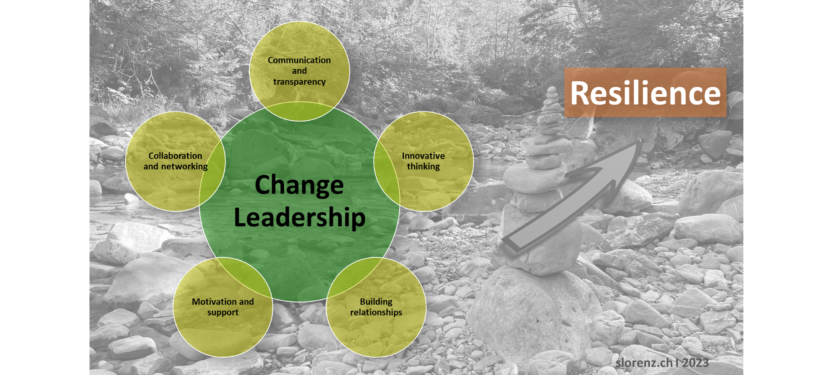Today is a cold and rainy day. I am sitting here in the living room and my thoughts are swinging back and forth while my eyes admire the rock formations of the front Eggflue. The hot coffee tastes very good to me right now.
One topic won’t let me go… Difficult times!
Difficult times are an inevitable part of the change process. Changes in personal or professional life can be accompanied by many challenges and difficulties, such as uncertainty, resistance, conflict, communication problems, loss of jobs or financial resources.
At such times, it can be difficult to stay motivated and positive, especially when the change has a major impact on one’s life or work environment. However, it is important to remember that resistance and difficulties are usually part of the change process and that it is possible to overcome these challenges and be successful.
One way to manage difficult times in the change process is to have a clear vision and communicate it regularly to ensure understanding and support from all stakeholders. It is also important to create an open and transparent communication climate so that all stakeholders can voice their concerns and questions and find solutions together.
It can also be helpful to foster a culture of trust and openness to reduce staff resistance and anxiety. By maintaining a positive attitude and an open mind, it is easier to deal with challenges during difficult times in the change process and find solutions that benefit everyone involved.
In addition, during difficult times in the change process, it can be helpful to focus on small steps and achievements rather than the totality of the change. By focusing on small successes and milestones, you can maintain a sense of progress and achievement that helps you stay motivated and navigate through difficult times.
Difficult times can be challenging for the global economy. When a crisis occurs, such as an economic crisis, pandemic or war, the impact on economies around the world can be felt.
A crisis can lead to a slowdown in economic growth and increase unemployment, which can lead to a decline in demand for goods and services. This in turn can lead to a decline in investment and consumption, which can further affect economies.
A crisis can also affect international trade relations and production, which can lead to a decline in trade volumes and value chains. A crisis can also lead governments to take measures to protect their economies, such as by imposing tariffs or other trade restrictions, which can have a negative impact on international trade.
On the other hand, difficult times can also create the need for innovation and change, which can help improve economies and make them more resilient. A crisis can also lead to increased cooperation between countries to address common challenges.
Positive leadership can help resolve difficult times in the global economy by creating a vision for the future and motivating and inspiring employees to work together to achieve goals.
Some helpful ideas from my point of view that are very supportive are summarised as follows:
👉 Communication and transparency: A positive leader can build trust and inform employees about the situation through open communication and transparency. It is important to keep employees informed and also listen to their opinions and concerns.
👉 Innovative thinking: Positive leaders can help employees change their mindset and find creative solutions to overcome challenges. By creating a supportive environment, they can help employees harness their skills and increase their innovation.
👉 Building relationships: A positive leader can build and maintain relationships to create a strong support base. To do this, the leader can have regular conversations with employees, listening to their needs and concerns.
👉 Motivation and support: A positive leader can motivate and support staff by giving them confidence that they can overcome challenges. By setting clear goals and expectations while providing support and feedback, they can encourage staff to do their best.
👉 Collaboration and networking: A positive leader can encourage collaboration and networking between departments and staff. To do this, the leader can organise regular meetings where staff can share ideas and solve problems together.
Difficult times can be challenging, but they can also provide opportunities to succeed. Changes and difficulties often occur on the road to success and how you deal with them can make the difference between success and failure.
In difficult times, it is important to keep a clear head and approach challenges rationally. A positive attitude and confidence in your own abilities are also important to overcome difficulties. It is also important to set realistic goals and focus on small steps to achieve the big goal.
Another way to overcome difficult times is to seek support from others. A team of supporters, mentors or coaches can help provide new perspectives, offer support and resources, and ease the path to success.
Furthermore, difficult times can also be an opportunity to learn and grow. Failures can be used as an opportunity to find out what went wrong and to become better. Experiences from difficult times can also be used to develop new strategies and approaches to overcome future challenges.
Overall, it is important to stay positive and focus on the big goal, even if there are obstacles. Difficult times can provide opportunities to grow, learn and improve in order to succeed in the end.
In conclusion, I would like to share with you two guiding principles that I find very valuable:
1. difficult times always open up a chance to learn something new in order to reach the desired goal.
2. the origin of the problem is not important, but who was there to solve it.
With these thoughts, I wish you a relaxing weekend and look forward to your comments and feedback.
Best regards
Stephan





